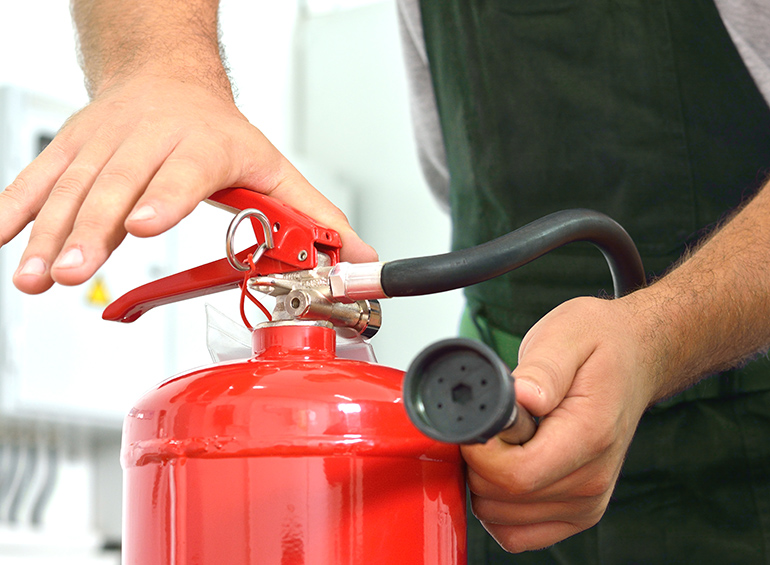Environmental Health and Safety

Mission + Vision
Our mission is to uphold a safe working environment for students and employees on all Detroit Mercy campuses. We do this by training, reporting, and changing the culture around safety. Our goals are to eradicate preventable accidents, foster confidence in emergency response, and instill commitment to our mission.
Chemical inventory
The University of Detroit Mercy invested in a chemical inventory management system called CHIMERA. Documenting our hazardous chemicals on one system will help to keep us compliant with state and federal regulations. Click CHIMERA to access chemical inventory for the University.
Right to know
According to the State of Michigan, “Employers must make available for employees in a readily accessible manner, Safety Data Sheets (SDS) for those hazardous chemicals in their workplace”. To stay in compliance, Facility Operations has been placing ‘Right to Know Signs’ in buildings where chemical hazards are stored. If you would like to request signs for your building or have any questions, please call Facility Operations at 313-993-1240 or email facilityoperations@udmercy.edu.
Safety Blog Recent Posts:
Check out our blog to get all the safety tips and resources available to you.
Safety Protocols
-
Lockout Tagout Policy
The Lockout Tagout Policy establishes the minimum requirements for the lockout of energy sources whenever maintenance or servicing work is done on machines. It shall be used to ensure that the machine or equipment is stopped, isolated from all potentially hazardous energy sources, and locked out before employees perform any servicing or maintenance work.
-
Bloodborne Infectious Disease Exposure Control Plan
Bloodborne Infectious Disease Exposure Control Plan (docx) - The purpose of this control plan is to limit or eliminate exposure to bloodborne infectious diseases by having written procedures that follow the MIOSHA Bloodborne Infectious Diseases Standard (R 325.70001-325.700016).
-
Chemical Hygiene Plan
The Chemical Hygiene Plan is a written program stating the policies, procedures and responsibilities that protect workers from the health hazards associated with the hazardous chemicals used in the workplace.
-
Snow Plan
The snow and ice removal plan will have details on the following: how to report slippery areas or areas that need snow removal, flow of communication, procedures of plowing and deicing including times one would expect to have roads, sidewalks, steps and parking lots cleared, and details of which areas are prioritized.
-
Emergency Response Plan
The Emergency Response Plan defines for the University of Detroit Mercy community the framework necessary to respond to emergencies.
-
Emergency Evacuation Sites
Corktown Campus Evacuated Building Gathering Points
500 feet from buildingSafe Assembly Stations
(Will be used if people need to
be moved from the Gathering
Point)Dental Clinic Parking Areas Wait for further instructions Riverfront Campus - School of Law Evacuated Building Gathering Points
500 feet from buildingSafe Assembly Stations
(Will be used if people need to
be moved from the Gathering
Point)Law School Student Parking Lot Student Parking Lot Law School Clinic Building Student Parking Lot Student Parking Lot Novi Campus Evacuated Building Gathering Points
500 feet from buildingSafe Assembly Stations
(Will be used if people need to
be moved from the Gathering
Point)Novi Campus Building Grass area South of Parking
LotWait for further instructions McNichols Campus Evacuated Building Gathering Points
500 feet from buildingSafe Assembly Stations
(Will be used if people need to
be moved from the Gathering
Point)Architecture Building Titan Athletic Field Calihan Hall Briggs Building Titan Athletic Field Calihan Hall Calihan Hall Kassab Mall Student Union and Ballroom Chemistry Building Titan Athletic Field Calihan Hall Health Professions Facility Titan Athletic Field Calihan Hall Commerce & Finance Building Titan Athletic Field Calihan Hall Engineering Building Buysse Ballpark - Softball Briggs Building Facilities Operations and Storage Kassab Mall Student Union and Ballroom Ford Life Sciences Building Titan Athletic Field Health Professions Facility Gardella Honors House Titan Athletic Field Calihan Hall Lansing-Reilly Hall Titan Athletic Field Calihan Hall McNichols Campus Library Titan Athletic Field Student Union and Ballroom Power House Buysse Ballpark - Softball Briggs Building East & North Quads Tennis Pavilion Calihan Hall Holden Hall Tennis Pavilion Calihan Hall Shiple Hall Tennis Pavilion Calihan Hall South & West Quads Tennis Pavilion Calihan Hall Reno Hall Tennis Pavilion Calihan Hall Student Union Buysse Ballpark - Softball Briggs Building Michael & Gail Whitty Student Fitness Center Buysse Ballpark - Softball Briggs Building -
Job Hazard Assessments
A JHA (Job Hazard Analysis/Assessment) is a dry run of a task to be performed. It is a tool to help analyze the hazards associated with each step of a project so that the proper controls are implemented to eliminate or reduce any hazardous consequences.
Laboratory Safety
Students and faculty working in a laboratory setting are exposed to chemical and biological hazards. Because safety is a priority at our University, we have protocols and guidelines like the Chemical hygiene plan, bloodborne infectious disease control plan, and a laboratory dress code guide, to ensure a safe working environment. Learn more about lab safety.
Recycling Programs
-
Green Initiatives
- General recycling bins located at Reno Hall, Shiple Hall, and the Riverfront Campus.
- Grease recycling dumpsters located at food service loading docks (Corktown and McNichols)
- Paper recycling dumpster located at Facility Operations yard entrance, behind Shiple Hall, and next to Reno Hall.
- Aluminum, plastic, and paper recycling containers are located in the residence halls for Custodial Services to pick up.
- Metal recycling dumpster located in Facility Operations yard.
- Yard waste recycling dumpster located in Facility Operations yard.
- Furniture is rarely thrown away; it is usually repurposed or recycled.
- Used motor oil and antifreeze from University vehicles and equipment are recycled.
- Freon and other refrigerant gases from failed cooling equipment are reclaimed and recycled.
- ITS department recycles computers and other electronic equipment.
- Alpha Phi Omega Service Fraternity collects plastic and paper in marked recycling bins throughout campus.
- Absopure® collects plastic bottles in designated bins placed near their vending machines around campus.
- Business Student Advisory Board recycles plastic within Commerce & Finance.
- Various individual departments implement internal recycling of paper that feeds into the available dumpsters on campus.
- Facility Operations recycles batteries.
- Fisher fountain water is treated so it does not have to be replaced as often.
- Various gases used around the University use recyclable/refillable gas cylinders.
- The University’s boiler system is a closed loop system so the treated water is heated into steam, circulated to the buildings, and is returned as water to be reheated again. The chiller system is also a closed loop system that reuses the water as well.
- 70 – 90% of our historic buildings’ clay roof tile can be reused.
- Much of the carpet tile used around the University is 100% recyclable.
- Light fixtures are being recycled and replaced with LED lamps that provide a much longer life and reduce materials sent to landfills.
- Campus Kitchen has a composting project in Dining Services to compost fruit/food clippings.
Environmental Testing FAQ
-
How can I get air and water quality testing for my office/ building?
Air quality testing is expensive and frequently requested by departments. Therefore, we have a policy to proceed with quality testing once your department has agreed to pay for testing unless there is significant evidence to suggest the air/water quality has been compromised.
-
How often is duct work cleaned out?
This procedure is only done when our HVAC personnel see there is a need.
-
How can I get access to environmental testing reports?
Test results can be requested through Human Resources.
- Phone: (313) 993-1036
- Email: hr@udmercy.edu
-
What hazards are associated with asbestos?
Asbestos is a known human carcinogen, and in its fibrous form, it can cause chronic lung disease as well as lung and other cancers. Symptoms and/or cancer may take many years to develop following exposure.
As long as the asbestos is not disturbed (broken, flaking, friable), it poses no threat to your health. If there are concerns about asbestos fibers, air quality testing can be done upon request. Please visit https://www.osha.gov/SLTC/asbestos/ for more info.
-
How are asbestos hazards controlled during renovation work?
All asbestos handling, including removal and encapsulation, is contracted out to licensed companies. Here is an example of the standard operating procedures used by one of our contractors.
-
What happens if I think I see friable asbestos?
Please contact Facility Operations immediately.
- Phone: (313) 993-1240
- Email: facilityoperations@udmercy.edu
-
What hazardous materials are present on campus?
All departments with hazardous material should have SDS (safety data sheets) on file. These files should be posted and accessible to all employees and students.
Contact Information:
Joel Gallihugh
Chief of Public Safety
gallihja@udmercy.edu
Edmund Black
Captain of Public Safety
blackedj@udmercy.edu
David Vandelinder
Director of Facility Operations and Construction Management
vandelda@udmercy.edu
Samantha English
Environmental Coordinator
englissl@udmercy.edu



